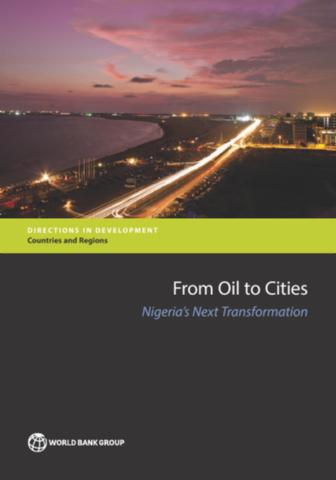From oil to cities : Nigeria's next transformation
 The Nigeria Urbanization Review serves the critical and timely purpose of understanding the challenges and opportunities of urbanization in Nigeria. The country’s rapid urban population growth and expansion is examined in relation to the account of its recent urban economic growth in order to seek for ways to finance urban development, particularly the provision of urban public goods and services. The objective of this analytical program is to provide diagnostic tools to inform policy dialogue and investment priorities on urbanization. This report serves the critical and timely purpose of focusing attention on the challenges and opportunities of urbanization in Nigeria. The executive summary at the front summarizes the key trends of Nigeria’s urbanization and sets out a framework to structure core urban challenges in view of underlying causes. Detailed analyses follow in the subsequent four chapters. In Chapter 1, the dynamics of Nigeria’s urbanization process are presented, with particular attention to the country’s rapid urban population growth, the very large-scale urban expansion, and the stubborn persistence of high levels of urban poverty, inequality and regional disparity. Chapter 2 provides an account of Nigeria’s recent urban economic growth, in view of the nature of the concentration of economic activity across the country’s states and cities, and of the limited performance of urban and regional economies in generating higher levels of employment and improving business climates. Chapter 3 turns to description and assessment of land management, urban planning and housing provision procedures and systems, which face a variety of challenges with regard to costs, affordability, capacity, equity and efficiency. Finally, Chapter 4 deals with the financing of urban development, particularly the provision of urban public goods and services, which is in need of both substantial finance and institutional and systemic improvements and reform.
The Nigeria Urbanization Review serves the critical and timely purpose of understanding the challenges and opportunities of urbanization in Nigeria. The country’s rapid urban population growth and expansion is examined in relation to the account of its recent urban economic growth in order to seek for ways to finance urban development, particularly the provision of urban public goods and services. The objective of this analytical program is to provide diagnostic tools to inform policy dialogue and investment priorities on urbanization. This report serves the critical and timely purpose of focusing attention on the challenges and opportunities of urbanization in Nigeria. The executive summary at the front summarizes the key trends of Nigeria’s urbanization and sets out a framework to structure core urban challenges in view of underlying causes. Detailed analyses follow in the subsequent four chapters. In Chapter 1, the dynamics of Nigeria’s urbanization process are presented, with particular attention to the country’s rapid urban population growth, the very large-scale urban expansion, and the stubborn persistence of high levels of urban poverty, inequality and regional disparity. Chapter 2 provides an account of Nigeria’s recent urban economic growth, in view of the nature of the concentration of economic activity across the country’s states and cities, and of the limited performance of urban and regional economies in generating higher levels of employment and improving business climates. Chapter 3 turns to description and assessment of land management, urban planning and housing provision procedures and systems, which face a variety of challenges with regard to costs, affordability, capacity, equity and efficiency. Finally, Chapter 4 deals with the financing of urban development, particularly the provision of urban public goods and services, which is in need of both substantial finance and institutional and systemic improvements and reform.
